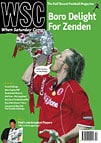 After failing to play his way out of Scottish Division Two, the midfielder looked set for the scrap heap in 2002. But as Neil Forsyth writes, he found an unlikely second wind
After failing to play his way out of Scottish Division Two, the midfielder looked set for the scrap heap in 2002. But as Neil Forsyth writes, he found an unlikely second wind
Generally speaking, football careers tend to arc in achievement. For some the peak comes achingly early: think Norman Whiteside, Lee Sharpe or Peter Marinello. More fortunate are those who delay the dip until late in their career, leaving earlier achievement undiluted. Kenny Dalglish, Alan Shearer and the 1997-98 Arsenal back four ease into this category.
Few players buck this trend, but one example is Leicester’s Billy McKinlay. Even if City stay up, the 34-year-old Scot is unlikely to spend another campaign in the Premiership. His age, along with a propensity for injury, should see his career winding down elsewhere when his contract expires in the summer. And so the arc is complete, it may appear. Well, not really: it was complete in 2002, only for McKinlay to embark on a course of self-rescue that would make Lazarus blush.
When McKinlay arrived at Blackburn Rovers in October 1995, many suggested the Premiership club had struck a £1.75 million bargain. For Dundee United, McKinlay had been one of the most influential midfielders in the Scottish Premier. Combative in the tackle and perceptive in the pass, he had earned 14 caps despite his playing style often placing himself on the injured list. After a surprise relegation, McKinlay asked for a transfer but appeased United fans with a hat-trick against rivals Dundee in one of his last games.
He progressed as expected at Blackburn, peaking in 1997-98 with 35 appearances and playing in the World Cup. The following season, stuttering form and injury meant McKinlay played just once after February. He was forced to look for a loan move. This was offered by Leicester, where he made one appearance, but it was Bradford City who took him on in November 2000.
Although McKinlay played a dozen games as a result, it was a forgettable experience as Bradford endured a notoriously inept campaign. After a defeat at Chelsea, McKinlay was seen removing his boots and hobbling across the pitch after an afternoon chasing shadows. In the summer he was once more faced with uncertainty, yet he would have required something beyond pessimism to envisage what the future held. By late November 2001, with the season under way, a frustrated McKinlay signed for Scottish Second Division outfit Clydebank. The Bankies were homeless, tenants of Morton, and attracting around 200 spectators. The unglamorous surroundings were not an immediate concern to McKinlay who required a brief affording of training facilities before a move to the Scottish top flight or to North America’s MLS.
However, as the weeks slipped by, McKinlay stopped being viewed as a short-term luxury and became a fully fledged Second Division player. Plying his trade round dilapidated grounds with no apparent escape route, he probably suspected that he had reached rock bottom. Not so, as a section of Clydebank fans turned on him over perceived shortcomings and the club’s general manager had to publicly criticise the abuse.
Both McKinlay’s career and Clydebank were in free fall. A dreadful post-Christmas run cost the team promotion and the last of McKinlay’s nine games was a home defeat in March. In a suitably depressing postscript, this would be Clydebank’s last season: the newly formed Airdrie United played cuckoo, buying the club to rename it and seize League membership.
McKinlay was now a candidate for seasonal depression as he faced another summer of unemployment, but his fortunes finally turned. If he was down on his luck, desperate and facing financial hardship, then Leicester City were his perfect match. When McKinlay offered to play for free in an attempt to win a permanent deal, Micky Adams readily agreed.
A paid contract would soon materialise as McKinlay was a key figure in Leicester’s astonishing promotion, playing 40 games and impressing fans with his consistency and unorthodox approach to earning a deal. Although a high squad number and little pre-season action suggested Adams maybe saw the Premiership as a step too far for the player, a one-year contract was the least that his contribution deserved.
It hasn’t gone unrewarded, with McKinlay forcing his way into the team in October. As he quietly puts in his usual committed displays, it is unsurprising that he is a calming influence amid the pressure of the relegation battle. Failure to stay up and no new contract in the close season would be disappointments, but they would be far from the nadir of Clydebank.
From WSC 206 April 2004. What was happening this month